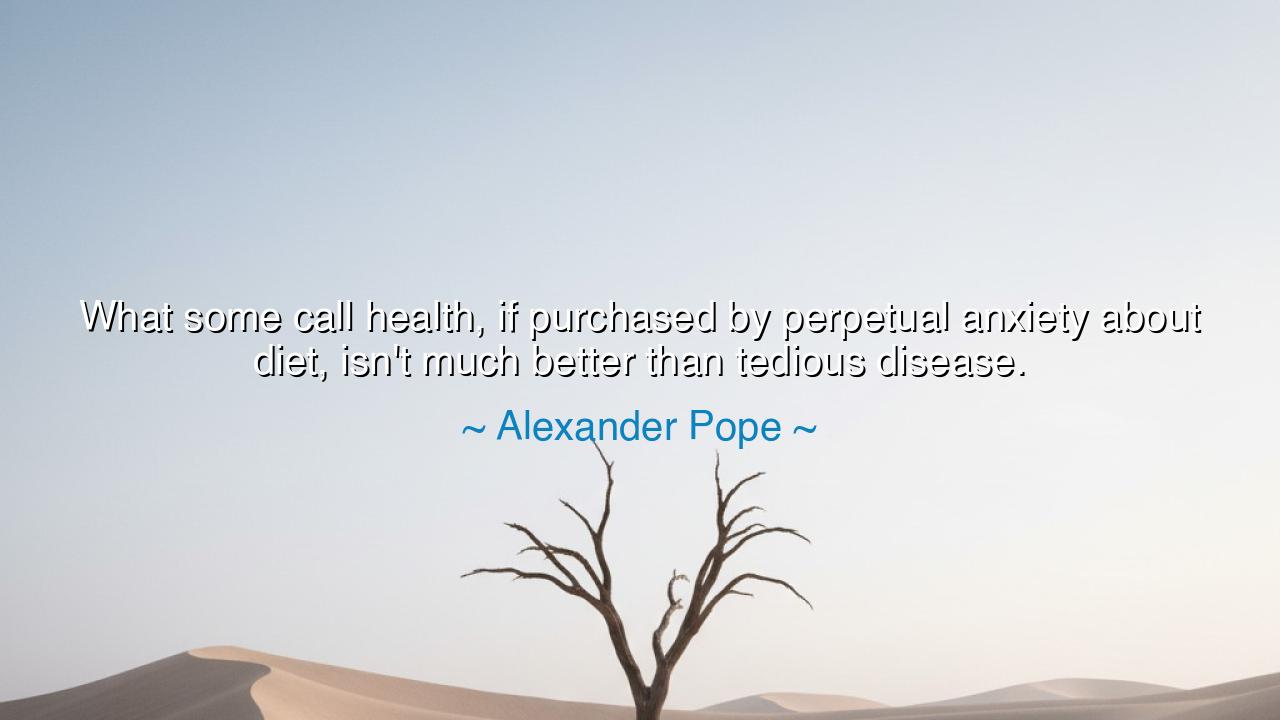
What some call health, if purchased by perpetual anxiety about
What some call health, if purchased by perpetual anxiety about diet, isn't much better than tedious disease.






On the Tyranny of Perfection: The Wisdom of Alexander Pope
Hear the wise and piercing words of Alexander Pope, who once said: “What some call health, if purchased by perpetual anxiety about diet, isn’t much better than tedious disease.” This is no idle remark of wit, but the counsel of a man who knew both frailty and philosophy. For Pope, born weak in body but mighty in spirit, understood that life’s truest health is not merely the stillness of disease, nor the absence of pain, but the harmony of the body and the peace of the soul. His words strike against the vanity of those who seek perfection through endless caution—who measure every morsel, fear every flavor, and in their obsession with preservation, forget to live.
Pope lived in the early eighteenth century, an age of both refinement and restraint. The world around him worshipped reason, yet trembled at nature. Medicine was still crude, and disease a common visitor; thus, many sought safety in rigid regimens—strict diets, elaborate tonics, and fear of indulgence. But Pope saw the irony: in striving too hard for health, people made themselves miserable. What use is a strong body if the spirit within it starves from constant worry? What joy is there in a long life lived under the shadow of fear? The poet reminds us that balance, not obsession, is the essence of well-being.
To understand his wisdom, recall the tale of Diogenes, the philosopher who lived in a barrel and mocked the luxuries of his fellow Greeks. When he saw a man drinking only water to maintain his purity, Diogenes smiled and said, “You have turned abstinence into vanity.” So it is with those who worship diet and discipline without measure—they turn virtue into bondage. For moderation, though praised by all, is practiced by few. Pope’s words are a warning: that to live forever guarding the body at the cost of the mind is to suffer a tedious disease indeed, one not of flesh, but of fear.
Consider also the example of Emperor Qin Shi Huang, who sought immortality with such fervor that he swallowed mercury, believing it would preserve his life. His search for endless health became his destruction. In his palace of gold, surrounded by doctors and elixirs, he perished not from weakness, but from excess. His story is the mirror of Pope’s teaching—that health purchased through anxiety and excess effort is no blessing. True vitality lies not in the desperate clinging to life, but in the graceful acceptance of its rhythm.
Even in our modern world, Pope’s insight echoes louder than ever. Many live enslaved to numbers on scales, to forbidden foods, to endless advice that promises purity but delivers panic. They count calories but forget gratitude, pursue diets but neglect delight. Their minds are weary though their bodies are lean. They have mistaken discipline for joy, and in doing so, they have lost both. As Pope saw centuries ago, this is not health, but a gentler kind of sickness—the illness of never being at ease within one’s own skin.
The lesson, then, is this: live wisely, but not fearfully. Care for your body, but do not make it your master. Eat with mindfulness, but also with gladness. Rest when you must, work when you can, and trust that life, imperfect as it is, still knows its own balance. Health is a garden that thrives on freedom, not a cage that confines you. If you water it with joy, it will flourish; if you choke it with anxiety, it will wither, no matter how carefully tended.
Therefore, O seekers of longevity, remember this teaching of Alexander Pope: that the truest health is harmony, not obsession. Let your diet serve your spirit, not enslave it. Let your care for the body be an act of love, not fear. For the wise do not merely survive—they savor. And to savor life, one must sometimes let go of control, trusting that a little indulgence, a little laughter, a little imperfection, are not enemies of health, but its very soul. So live not as one guarding against death, but as one truly alive—and you will find that your days, though mortal, are radiant and free.






AAdministratorAdministrator
Welcome, honored guests. Please leave a comment, we will respond soon